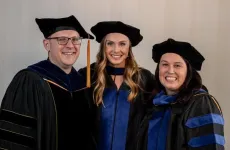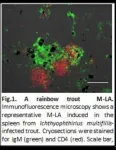(Press-News.org) Philadelphia, December 1, 2023 – Chimeric Antigen Receptors (CARs) have opened up an exciting new field of therapeutic advancements for rare and difficult-to-treat cancers, as they have the ability to deliver targeted therapies that can kill tumor cells. Peptide-centric CARs (PC-CARs) rely on specific peptide “barcodes,” which are derived from proteins within the cell created by potentially cancer-causing oncogenes, are designed to find and target cancer cells. These “barcodes” are displayed by human leukocyte antigens (HLAs), which help the immune system distinguish its own proteins from foreign invaders, like viruses.
However, HLAs are derived from the most “polymorphic” genes, with more than 25,000 alleles – stretches of DNA that code for proteins that carry out essential functions – that could vary between them, making it difficult to design PC-CARs that target the specific alleles associated with different cancers.
Now, researchers from two closely collaborating labs at Children’s Hospital of Philadelphia (CHOP) have solved a three-dimensional protein structure that explains how PC-CARs can recognize the “backbones” of these HLA complexes. The structural information will now allow researchers to understand how CARs recognize tumor-associated antigens among different polymorphic HLA alleles, thereby opening up more possibilities for designing precision medicine strategies for more complex and difficult-to-treat tumors.
The findings were published online today by the journal Science Immunology.
“If CARs are not matched properly to target the specific alleles associated with certain cancers, there is a risk of inducing toxicity without providing any therapeutic benefit,” said senior author Nikolaos G. Sgourakis, PhD, Associate Professor in the Center for Computational and Genomic Medicine at CHOP. “By looking at their 3-D complex structures, we can use these findings to design CARs that are able to target multiple HLAs and increase the efficiency of therapeutic design.”
Earlier CAR therapies could only target cancer-specific antigens on the surface of tumor cells, and most of these reside within the cells. However, researchers have found that these previously inaccessible targets are eventually degraded into peptides, which can be expressed on the surface like “barcodes” and then targeted by therapy. Even then, with so much variability in the alleles of the HLA, CAR therapies might only be able to help a fraction of patients with tumors, depending on which peptides are expressed on the surface of a tumor cell.
Since HLAs have more than 25,000 potentially mutated alleles, going through them one-by-one to find potential targets and design associated CAR therapies is far too complex a task. In this study, however, researchers used a combination of biochemical binding assays, molecular dynamics simulations and structural and functional analyses to determine that certain classes of HLAs are cross-reactive, meaning that different antigens can be similarly recognized by PC-CAR therapy. In other words, while the peptide “barcodes” may have significant variability, the “backbone” of these HLAs is similar enough to be recognized by these therapies. This work was carried out by a group of undergraduate and graduate students from the University of Pennsylvania and CHOP senior scientists from the Sgourakis Lab.
CHOP has been a pioneer in the development of PC-CARs. Senior study co-author John M. Maris, MD, pediatric oncologist and Giulio D'Angio Chair in Neuroblastoma Research at CHOP, concurrently published an updated paper in the journal Nature about the development and effectiveness of PC-CARs, and patients are currently being recruited for clinical trials based on their HLA genotypes to further explore the effectiveness of PC-CARs for treating rare and complex forms of cancer.
“For any CAR T cell therapy to be both safe and effective, one must find ‘targets’ for the T cells to find the tumor. PC-CAR T cells hone to very specific targets that are only on cancer cells and not on normal healthy cells,” Maris said. “This study essentially provides us with a blueprint for how to integrate new knowledge about the structural biology of HLAs as well as PC-CARs in this exciting field of new options for treating challenging cancers.”
This study was supported by a St. Baldrick’s Foundation-Stand Up to Cancer (SU2C) Dream Team Translational Research Grant SU2C-AACR-DT-27-17. Research Grants are administered by the American Association for Cancer Research, the Scientific Partner of SU2C. SU2C is a program of the Entertainment Industry Foundation administered by the American Association for Cancer Research. This work was also supported by NIH grants U54CA232568 as part of the Beau Biden Cancer Moonshot Program and NIH R35CA220500, R01AI143997, R35GM125034, Science Center Quod Erat Demonstrandum (QED) program at Philadelphia Science Center, Children’s Hospital of Philadelphia Cell and Gene Therapy Collaborative, Giulio D’Angio Endowed Chair, and Next Generation T Cell Therapies for Childhood Cancers – Cancer Grand Challenges, which is supported by Cancer Research UK, the National Cancer Institute, and the Mark Foundation.
Sun et al, “Structural principles of peptide-centric Chimeric Antigen Receptor recognition guide therapeutic expansion.” Sci Immunol. Online December 1, 2023. DOI: 10.1126/sciimmunol.adj5792
About Children’s Hospital of Philadelphia: A non-profit, charitable organization, Children’s Hospital of Philadelphia was founded in 1855 as the nation’s first pediatric hospital. Through its long-standing commitment to providing exceptional patient care, training new generations of pediatric healthcare professionals, and pioneering major research initiatives, the 595-bed hospital has fostered many discoveries that have benefited children worldwide. Its pediatric research program is among the largest in the country. The institution has a well-established history of providing advanced pediatric care close to home through its CHOP Care Network, which includes more than 50 primary care practices, specialty care and surgical centers, urgent care centers, and community hospital alliances throughout Pennsylvania and New Jersey, as well as an inpatient hospital campus with a dedicated pediatric emergency department in King of Prussia. In addition, its unique family-centered care and public service programs have brought Children’s Hospital of Philadelphia recognition as a leading advocate for children and adolescents. For more information, visit https://www.chop.edu.
END
CHOP researchers discover deep structural biology connections that help improve CAR therapy
Identifying “backbones” that link complexes can help maximize CAR therapy across different variants and tumor types
2023-12-01
ELSE PRESS RELEASES FROM THIS DATE:
Can preeclampsia be prevented?
2023-12-01
NEWS RELEASE
EMBARGOED UNTIL FRI, DEC. 1 -- 2:00 P.M. EASTERN
Contact
Colleen McDonald - Sr. Consultant, Earned Media
414.801.3146 | cmcdonald@mcw.edu
Milwaukee, Wis. – Dec. 1, 2023 – Preeclampsia is a mysterious condition that occurs in about one of 10 pregnancies without any early warning signs. After 20 weeks or more of normal blood pressure during the pregnancy, patients with preeclampsia will begin to experience elevated blood pressure and may also have increased levels of protein in their urine due to hypertension reducing the filtering power of the kidneys. Prolonged hypertension due ...
Meditation training can support wellbeing in older adults
2023-12-01
Following an 18-month meditation programme can improve the wellbeing of older adults, finds a new randomised controlled trial by an international team co-led by UCL.
The findings, published in PLOS ONE, show that meditation can improve people’s awareness, connection to others, and insight.
While the meditation training did not confer significant benefits on two commonly used measures of psychological wellbeing and quality of life, the researchers say their findings may reveal limitations in existing methods of tracking wellbeing.
Lead author Marco Schlosser (UCL Psychiatry and University of Geneva) said: “As the global population ...
Research shows human behavior guided by fast changes in dopamine levels
2023-12-01
What happens in the human brain when we learn from positive and negative experiences? To help answer that question and better understand decision-making and human behavior, scientists are studying dopamine.
Dopamine is a neurotransmitter produced in the brain that serves as a chemical messenger, facilitating communication between nerve cells in the brain and the body. It is involved in functions such as movement, cognition and learning. While dopamine is most known for its association with positive emotions, scientists are also exploring ...
Scientists navigate uncharted waters in fish immunology research
2023-12-01
Upon infection or immunization, all jawed vertebrate species generate proteins called antibodies that bind and neutralize pathogens. Strong and long-lasting antibody responses in warm-blooded species such as mammals are produced in secondary lymphoid microstructures (SLMs) among which germinal centers (GCs) are the centerpiece. Despite the apparent absence of GCs or similar SLMs in cold-blooded vertebrates (e.g., fish), these species can mount significant antibody responses that can persist for several months. Thus, for decades, the outstanding question has remained as to how and where ...
Study explores how pre- and postnatal B-12 vitamins improve breast milk vitamin B-12 levels, which supports infant brain development
2023-12-01
Babies and children need vitamins, including vitamin B-12, to help their brains and bodies develop and grow. Babies get B-12 from their mothers and can have low levels of B-12 if their mothers had low vitamin levels during pregnancy and breastfeeding. The vitamin B-12 levels of infants strongly depend on maternal levels. Adequacy of vitamin B-12 in breast milk is particularly important for infants during the first six months of life when breastfeeding is highly recommended. Even after the first six months of life, breast milk may continue ...
Botany must feature more prominently on the school curriculum to promote awareness of climate change, study warns
2023-12-01
Children must be taught more about the importance of plants if education about climate change and sustainability is to be effective, experts have warned.
Botany should feature more heavily in the school curriculum, and be a greater focus of educational policy, the study says.
It warns neither the importance of plants for sustainability or the threats facing many of them are adequately represented in science education. While the problem has been identified for some time, attempts to address it have often struggled to gain a foothold in science education practice.
Dr Bethan Stagg from the University of Exeter and Professor Justin Dillon ...
ADA Forsyth scientists work to bring tissue regeneration to replace root canal treatment
2023-12-01
Cambridge, MA - Want to avoid a root canal? In the future, you might be able to opt for tissue regeneration instead. ADA Forsyth scientists are testing a novel technology to treat endodontic diseases (diseases of the soft tissue or pulp in your teeth) more effectively. The study, “RvE1 Promotes Axin2+Cell Regeneration and Reduces Bacterial Invasion,” which appeared in The Journal of Dental Research, demonstrates regenerative properties of resolvins, specifically Resolvin E1 (RvE1), when applied to dental pulp. Resolvins ...
University of Houston challenges students to solve plastic waste crisis
2023-12-01
Plastics are firmly entrenched in today’s world thanks to their cheap, light and versatile nature, but the downside is that plastic waste continues piling up. Earlier this year, United Nations Secretary-General Antonio Guterres said that every day, the equivalent of over 2,000 garbage trucks full of plastics is dumped into our oceans, rivers and lakes.
According to the World Economic Forum, the United States only recycled about 6% of the 40 million tons of plastic waste it generated in 2021. Around the world, about 400 million tons of plastic waste is produced each year. Much of it ends up in landfills, oceans and natural ...
Auburn University invites aspiring physicists to PhD program information meeting
2023-12-01
Auburn University's Department of Physics is hosting a special meeting targeting college students passionate about pursuing a PhD in Physics. This engaging event is set for December 8 at 2 PM Central Time. Interested individuals can join the session virtually via Zoom at https://aub.ie/faKH5W.
Studying Physics at Auburn University is an immersive journey into the universe's fundamental principles. Our PhD program offers a robust foundation in physics and promotes groundbreaking research and discovery. Known for small class sizes and personalized ...
Social media influencers may affect more than voter opinions
2023-12-01
UNIVERSITY PARK, Pa. — If Thanksgiving dinner conversations have turned into heated political arguments over the past two decades, social media may be to blame. Popular social media figures — or influencers — who create or share distorted political messages may cause political parties to moderate their policies to win over independent voters in general elections but tend to polarize the rest of society, according to researchers who created a model to study how social media may affect election ...
LAST 30 PRESS RELEASES:
Heart attack deaths rose between 2011 and 2022 among adults younger than age 55
Will melting glaciers slow climate change? A prevailing theory is on shaky ground
New treatment may dramatically improve survival for those with deadly brain cancer
Here we grow: chondrocytes’ behavior reveals novel targets for bone growth disorders
Leaping puddles create new rules for water physics
Scientists identify key protein that stops malaria parasite growth
Wildfire smoke linked to rise in violent assaults, new 11-year study finds
New technology could use sunlight to break down ‘forever chemicals’
Green hydrogen without forever chemicals and iridium
Billion-DKK grant for research in green transformation of the built environment
For solar power to truly provide affordable energy access, we need to deploy it better
Middle-aged men are most vulnerable to faster aging due to ‘forever chemicals’
Starving cancer: Nutrient deprivation effects on synovial sarcoma
Speaking from the heart: Study identifies key concerns of parenting with an early-onset cardiovascular condition
From the Late Bronze Age to today - Old Irish Goat carries 3,000 years of Irish history
Emerging class of antibiotics to tackle global tuberculosis crisis
Researchers create distortion-resistant energy materials to improve lithium-ion batteries
Scientists create the most detailed molecular map to date of the developing Down syndrome brain
Nutrient uptake gets to the root of roots
Aspirin not a quick fix for preventing bowel cancer
HPV vaccination provides “sustained protection” against cervical cancer
Many post-authorization studies fail to comply with public disclosure rules
GLP-1 drugs combined with healthy lifestyle habits linked with reduced cardiovascular risk among diabetes patients
Solved: New analysis of Apollo Moon samples finally settles debate about lunar magnetic field
University of Birmingham to host national computing center
Play nicely: Children who are not friends connect better through play when given a goal
Surviving the extreme temperatures of the climate crisis calls for a revolution in home and building design
The wild can be ‘death trap’ for rescued animals
New research: Nighttime road traffic noise stresses the heart and blood vessels
Meningococcal B vaccination does not reduce gonorrhoea, trial results show
[Press-News.org] CHOP researchers discover deep structural biology connections that help improve CAR therapyIdentifying “backbones” that link complexes can help maximize CAR therapy across different variants and tumor types





